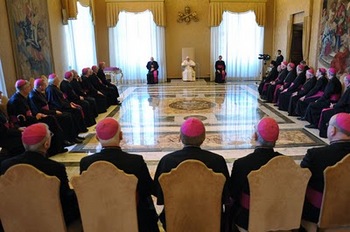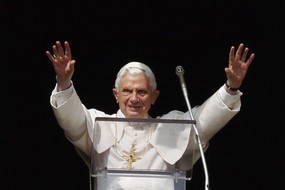Lectio Divina is of course central to Benedictine spirituality,
with several hours a day of prayerful reading of Scripture and other spiritual
texts required of monks in the Rule.
And it is also one of the central themes of Pope
Benedict XVI's Apostolic Exhortation Verbum Domini. Scattered through the
document are the reasons why lectio is so crucial. Here is my summation
of the reasons he sets out for why we should do lectio divina.
1. To please God by listening to him. Pope quotes
Origen: "Do your reading with the intent of believing in and pleasing God."
2. To build the Church as a
community. "While it is a word addressed to each of us
personally, it is also a word which builds community, which builds the
Church...The reading of the word of God... enables us to deepen our sense of
belonging to the Church, and helps us to grow in familiarity with God."
3. To nourish and sustain us 'on our journey of
penance and conversion': through it, we grow in love and truth.
4. In order to discern God's will for us,
and convert us: "Contemplation aims at creating within us a truly
wise and discerning vision of reality, as God sees it, and at forming within us
"the mind of Christ" (1 Cor 2:16).
The Pope particularly recommends lectio divina to
seminarians because: "It is in the light and strength of God's word that one's
specific vocation can be discerned and appreciated, loved and followed, and
one's proper mission carried out..." Lay people to should be trained, he
urges, "to discern God's will through a familiarity with his word, read and
studied in the Church under the guidance of her legitimate pastors."
He goes on: "Saint Paul tells us: "Do not be conformed
to this world, but be transformed by the renewal of your mind, that you may
prove what is the will of God, what is good and acceptable and perfect " (12:2).
The word of God appears here as a criterion for discernment: it is "living and
active, sharper than any two-edged sword, piercing to the division of soul and
spirit, of joints and marrow, and discerning the thoughts and intentions of the
heart" (Heb 4:12).", and "....by nourishing the heart with thoughts of God, so
that faith, as our response to the word, may become a new criterion for judging
and evaluation persons and things, events and issues"...."



